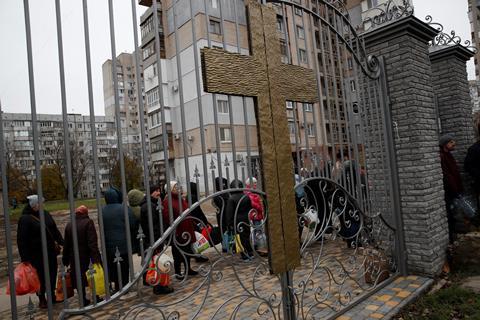When living through conflict, the season of Advent – and the coming of the Prince of Peace - takes on an even greater significance. But peace is not just about the absence of war, says Taras Dyatlik. It is about God’s presence in our hearts and minds

In the Old Testament book of Micah, we read that God: “will be our peace when the Assyrians invade our land and march through our fortresses” (Micah 5:5).
During a time of peace, we may read this text during Advent as just another messianic prophecy. But reading while living through an ongoing war is a totally different experience. As you seek peace for your broken soul and for the deeply traumatised people you work with daily, it takes on a new, deeper meaning.
God is the source of our shalom amid the hopelessness
Micah wrote his prophecy about the Messiah when the Assyrians had invaded the land of Israel. It was a time of fear, despair, death and of God’s discipline of his people. However, it is precisely at this time of hopelessness that the people of God heard a promise about the hope to come: “He will stand and shepherd his flock in the strength of the Lord, in the majesty of the name of the Lord his God”.
Then Micah continues: “And they will live securely, for then his greatness will reach to the ends of the earth. And he will be our peace when the Assyrians invade our land” (Micah 5:4–5).
The source of shalom
During war, it is a time of deep despair. We look for external peace as an end to fighting or, at the very least, a temporary ceasefire. We want to experience peace as an internal state of our souls and minds. When the Assyrians invaded Israel however, Micah described peace as God being present among his frightened and suffering people, being the source of their shalom.
As followers of Christ in Ukraine right now, we are challenging God from the depths of our hearts. As a result of our profound and ongoing pain, we can be afraid to lean on God and trust in him. Often, he feels far away. We ask ourselves: If God is here, how could this war have started? Why have our friends and loved ones died? It is a tempting thought process to follow. But God is present with us, in times of peace and times of suffering, whether we feel it or not.
Wresting with God
The story of Jacob struggling with God (Genesis 32) encourages me to keep living and serving God whatever my circumstances. As he wrestled with God, he did not know what awaited him the following day on the other side of the stream. Would he be confronted by war with his brother or a life of peace? I find myself, like Jacob, crying out to the Lord: “I will not let you go unless you bless me!” (v26).
Micah described peace as God being present among his frightened and suffering people
Perhaps we cannot appreciate the discipline and blessing of the Father - even during a war - without first wrestling with him. To bring about humility in us, God sometimes needs to deal with the dark depths of our souls – the places we often hide from those we love immensely. This darkness can only be dispersed by the presence of God, even if we try to struggle with him like Jacob.
When I lose peace and am overwhelmed with fear or panic regarding tomorrow, I ask only one thing: in the darkness of the night, may I prefer to struggle with God like Jacob than serve him falsely like Annas and Caiaphas in the temple. You may hurt my thigh, strike and humble me, but you also bless me and give me yourself as the peace.
Light in the darkness
In Ukraine, we greet this Advent season at a time of war. But in it, we learn not only to pray for peace, but also to acknowledge that peace is not just about the absence of war. It is about God’s presence in our hearts and minds; he is the source of our shalom amid the hopelessness.
It is about his light over the darkness, regardless of the pain we experience.
Whatever we are going through – whether war, suffering, sin or pain - our peace is you, Emmanuel, God with us.
































No comments yet